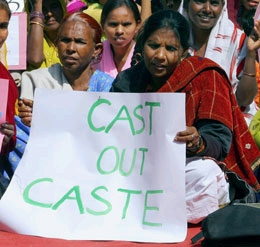
This article was published on The Times of India, August 13, 2009.
Ahmedabad : A huge number of Dalit students marched through the city roads on Monday. They were protesting against manual scavenging which is still practised in Gujarat. The rally started from Vadaj and ended at Gandhi Ashram, where a public hearing was held. The students, who study in government schools are still being forced to clean toilets in their schools.
Bhagwati Parmar, 13, a resident of Paliyad village in Botad taluka of Bhavnagar said, “I dropped out of school in 2004 when I was in class III and would go along with my father to dump garbage. But, now I live with my mother after my father died of kidney ailment. We live in utter poor conditions and so I have to go to clean or sweep when someone asks me to do so. I still go to Darbargadh for cleaning work, 2 to 3 times a month and also collect trash from the roads with other girls. For this, I get Rs 5 to Rs 15 with which we buy milk to make tea. It is necessary to make ends meet.”
Gautam Dodiya, 15, who lives in Dhoda village in Umrala taluka of Bhavnagar district said, “I stay with my mother after my father’s death, he was an alcoholic. I studied till class V and then left school because I was asked to clean urinals and toilets there. But, to earn a living I still go once a month to clean soak pit and I get Rs 200.”
 Similarly, Bharatkumar Chandubhai, 13, who lives in Aslali village in Matar taluka of Kheda district said, “I study in a government school in my village. Even I faced the wrath of being a Dalit. I am told to clean up urinals in my school once a week.”
Similarly, Bharatkumar Chandubhai, 13, who lives in Aslali village in Matar taluka of Kheda district said, “I study in a government school in my village. Even I faced the wrath of being a Dalit. I am told to clean up urinals in my school once a week.”
“Manual scavenging is a forced caste-based occupation where more than 1.3 million people in the country are affected by this practice,” said Manjula Pradip trustee of Navsarjan trust.
Dalit children, mainly whose parents are scavengers, are forced to do menial works like cleaning toilets and classrooms and they are also discriminated in schools, she alleged. The students, who took part in the rally accused school authorities of forcing them to clean rubbish.
“Scavenging has been outlawed in the country but it is still practised in a developed state like Gujarat,” said Martin Macwan, a social activist, alleged.




 Similarly, Bharatkumar Chandubhai, 13, who lives in Aslali village in Matar taluka of Kheda district said, “I study in a government school in my village. Even I faced the wrath of being a Dalit. I am told to clean up urinals in my school once a week.”
Similarly, Bharatkumar Chandubhai, 13, who lives in Aslali village in Matar taluka of Kheda district said, “I study in a government school in my village. Even I faced the wrath of being a Dalit. I am told to clean up urinals in my school once a week.”